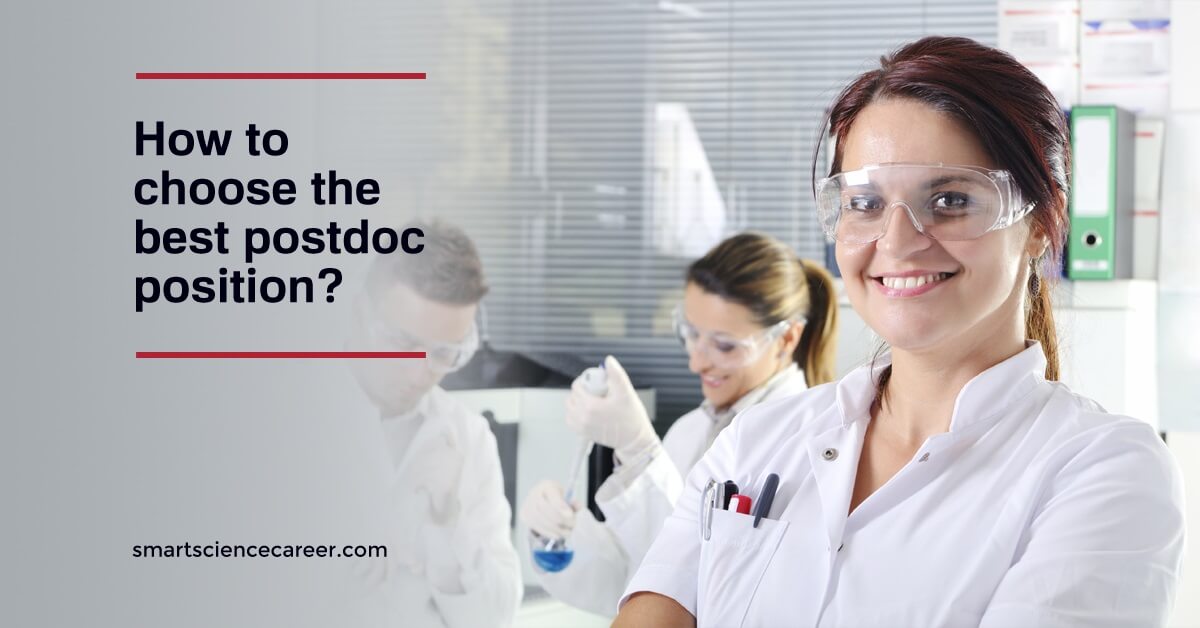How to choose the best postdoc position?
Choosing the best postdoc position for your future career in science is essential. However, most young scientists have no plan for finding the position(s) that fit best and choosing with care. Several key questions will help you find the postdoc position that fits your needs, talents, and skills.
Define carefully which goals you want to reach during your postdoc period!
How to choose a postdoc position? An important rule for a happy life is to define the goals you want to reach and how you want to feel while you are pursuing these goals.
Many things are unpredictable, but you probably know pretty well which private and family conditions you want during your postdoc period and in which field you want to work.
You may have to think more carefully about which impact factors you aim at, how many papers you want to generate, and which technical and transferable skills you want to learn.
The better you know what you want, the easier it is for other people to support you in finding the best position for you and for which you are the best candidate.
Both aspects are important – you should feel perfectly well in the environment and bring the personality, skills, and talents needed in the new environment.
Which private and family conditions do you want?
Your private and family situation should be a major concern to ensure you are happy during your postdoc position.
Three main questions help you to define your aspirations.
You should think carefully about
- whether you really want to go abroad,
- whether you want a long-distance relationship with your partner (and maybe your children) – or move together,
- whether you want a joint postdoc with your partner.
Do you really want to go abroad?
Most research institutions highly value international experiences – and there are good reasons to work abroad:
A scientist who has experienced the culture of other laboratories, different leadership styles, and cultural challenges (including feeling lost or experiencing xenophobia) typically develops a much broader view of science and cultural differences and understands better the challenges that young foreigners face who are working in his/her lab.
Working abroad increases your stress resistance, improves your ability to solve problems, and may broaden your international network.
Many prestigious universities explicitly demand international mobility from their young professors and do *not* select candidates without international research experiences.
However, working abroad comes with a price: there are several unpleasant side-effects of international mobility that nobody ever talks about, such as feeling lost and lonely, losing touch with your old friends and circles, and paying too much money.
Thus, make sure you know the advantages and disadvantages of going abroad and how to handle them.
Long-distance relationship or moving together?
If you go abroad, your relationship will suffer Inevitably.
In most cases, long-distance relationships are not experienced as easy. You can only communicate via email, phone, or online, which is, of course, much less intimate than being together in the same room.
In addition, you may feel lonely and get in contact with other attractive people who may appear to be an interesting alternative to your existing relationship.
If you have children, they will miss you terribly, you may miss them terribly, and you will not participate in their life for quite some time.
On the other hand, moving to a foreign country as a couple (or a family) is stressful for a relationship. If only one partner has a job, the other partner may feel lonely and useless and get frustrated or depressed.
If both have a position, the two partners may experience substantial differences in the quality of their work, their supervision, their colleagues, and the working environment, as well as the ease of integration.
In addition, it may be rather tricky to meet new people as a couple because it is psychologically more difficult to start a conversation with a couple. It is also apparent that you are not available as a potential erotic partner.
Joint postdoc with your partner?
Going abroad together for a postdoc position has many advantages. You avoid the inevitable problems of a long-term relationship. You can cope better with loneliness, being homesick, and possible discrimination as a foreigner. You share many experiences and challenges which may strengthen your relationship.
The organizational and administrative effort is shared, which may make it easier. Both partners experience similar working conditions and understand the situation of the other perfectly well.
Working together in the same lab allows effective collaboration and participation in joint projects, leading to more or better publications.
However, it may also lead to unpleasant competitive situations depending on your relationship type. Working in different labs may be better for developing an independent career, but it comes with the risk that one partner experiences better working conditions, salary, or output.
Which impact factors and how many papers do you want?
When going abroad, you should aim for an excellent publication output. It is not always easy to determine the perfect duration of a postdoc period.
A postdoc period is often short (2-4 years) and does not always get extended. A second one may follow the first postdoc position, but you may also start applying for academic or industry positions.
For professorship positions, your publication list must be excellent. For industry positions, your technical and transferable skills may be more critical. To learn more about developing a clever publication strategy, read more here: What is the best scientific publication strategy?
There are good arguments to focus on one or only a few papers with high impact factors, provided the supervisor is excellent, substantial funding is available, and the infrastructure is state-of-the-art.
As a rule of thumb, I would predict that a very high impact factor publication (IF > 10) means that you will work extremely hard, while 1-3 high to excellent impact factor papers (IF 5-9) will allow you more freedom.
You should also consider the working environment – if you go to a top lab that publishes very highly, you will probably work in a very competitive environment.
Before applying, you should talk to *several* former and present lab members to get a rough idea about the working conditions.
Read more here: The most intelligent strategy to get hired in science.
Which technical skills do you want to learn?
The postdoc position is the perfect environment to learn fancy techniques that will distinguish you from others later and qualify you for specific positions only a few can fill.
We often see PhD students and even postdocs who have mastered and practiced only one or two very common techniques, such as immunohistochemistry or qPCR.
The other extreme are persons who claim to know a multitude of techniques but demonstrate only very superficial knowledge. The golden middle way is, of course, to select a few techniques that are not completely common and become very experienced with them.
High expertise in a few fancy techniques may be an advantage for industry positions. In contrast, your technical expertise often plays a minor role for professorship positions.
Some colleagues believe that a professor should *not* be the best technician in the lab. In contrast, they outsource specific technical expertise (for example, by collaborating with experts in the field) or hire a competent postdoc.
Thus, for professorship positions, young scientists often overrate technical skills. Other skills may be considered more critical. Read more here: How to become a professor?
Which transferable skills do you want to learn?
The postdoc position is perfect for learning management, communication, and leadership skills. There is a long list of skills that are considered necessary for leading a research group in academia and industry.
The postdoc period is also the time to develop scientific independence and develop clear ideas about your future lines of research, and on how to raise grant money.
Before applying, you should ask former and current lab members whether they have learned these skills and whether they could learn grant writing and raise substantial grant money.
How long do you want to hold a postdoc position?
How long are postdoc positions? Postdoc positions typically last anywhere from 1 to 3 years. No surprise, the duration can vary depending on the field, funding availability, and the goals of the research project. In some cases, postdocs are renewed annually, extending up to 5 or even 6 years. However, there are good arguments that your postdoc phase should not be shorter than 1 year or longer than 6 years.
Which salary do you want?
Thus, you should get an appropriate salary that aligns with your skills and years of related experience. Salary is one of several crucial factors to choose a position. If you learn extraordinary skills, publish in high-impact journals, and the working environment is stimulating, you might accept a lower salary.
However, economic stability is crucial to be a good scientist. Therefore, as a principle, if possible, I would avoid any underpaid position because it will negatively affect your salary negotiations for your next position.
It always helps to improve your communication skills; please read my article on the best books on communication and the best books on salary negotiation and getting a raise
How to choose the best outcomes?
In summary, you should enjoy your postdoc position and make it a good time. You should go for the big wins, such as high-impact factors, big grants, and fancy techniques.
However, you should carefully consider the consequences for your relationship, family, and finances by addressing the abovementioned questions.
Acknowledgments
I have used AI systems, including Grammarly, Google Gemini, and ChatGPT, to enhance the English and comprehensiveness of this article.
Recommended reading
The following articles may also interest you:
- Is being a professor worth it?
- What is tenure?
- Should I Become A Professor? Success Rate 3 %!
- Am I good enough for a career in science?
- Should I have senior authorships as a postdoc?
- What is a postdoc?
- For how long should I be a postdoc?
- Should I quit my postdoc?
- Am I doing enough for my scientific career?
- Should I become a long-term postdoc?
- Do postdocs need leadership skills?
- Job interview outfits in science – what to wear?
- Assistant professor and associate professor – what is the difference?
- What is a Reader at a university?
- How to ask for a letter of recommendation?


